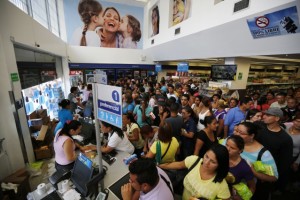Venezuela’s Bolivar worth less than a penny
Venezuela’s national currency Bolivar worth less than a penny. Just a month ago VEF/USD was 279 VEF for 1 USD and even that was pretty grim outlook for Venezuela. Currently, 1 USD is exchanged for 408 VEF according to unofficial exchange rates, which most Venezuelans use when trying to trade currency. Put another way, 1 […]

 Venezuela’s national currency Bolivar worth less than a penny. Just a month ago VEF/USD was 279 VEF for 1 USD and even that was pretty grim outlook for Venezuela. Currently, 1 USD is exchanged for 408 VEF according to unofficial exchange rates, which most Venezuelans use when trying to trade currency. Put another way, 1 VEF is worth 0,002 USD or less than a penny. The country’s currency lost nearly half of its value since the beginning of May. This is another sign that Venezuela is perhaps the weakest economy in the world. The country relies heavily on oil exports to support its economy, which was under pressure even before oil prices collapsed in the autumn and winter.
Venezuela’s national currency Bolivar worth less than a penny. Just a month ago VEF/USD was 279 VEF for 1 USD and even that was pretty grim outlook for Venezuela. Currently, 1 USD is exchanged for 408 VEF according to unofficial exchange rates, which most Venezuelans use when trying to trade currency. Put another way, 1 VEF is worth 0,002 USD or less than a penny. The country’s currency lost nearly half of its value since the beginning of May. This is another sign that Venezuela is perhaps the weakest economy in the world. The country relies heavily on oil exports to support its economy, which was under pressure even before oil prices collapsed in the autumn and winter.
The President and member of the Socialist Party Nicolas Maduro said that the Bolivarian revolution that began during his late predecessor, Hugo Chavez, was a successful move. Its aim is to distribute wealth equally among the citizens of the country. Therefore, Maduro continued to perform massive public spending programs to appeal to the poor in Venezuela. But the collapse of the Venezuelan bolivar only created more inequality. The divide between those who can pay to exchange their money in dollars and those who can not, is increasing. Abyss is most evident in local grocery stores.
The government brings many consumer goods such as toilet paper, beef and cosmetic products, but now can not pay for them. Venezuelans waiting for hours in front of stores hoping to buy at least basic products such as milk and flour. Government of Maduro is now using barter trade transactions. Uruguay pay for beef in Venezuela of the oil it buys from the country. In February, Prime Minister of Trinidad and Tobago proposed an exchange of toilet paper for Venezuelan oil. Representatives of Venezuela declined to comment on the offer. There are a few warning signs for Venezuela and the future of its economy. First, US companies in Venezuela are lubricated. Many US companies doing business in the country and are now losing hundreds of millions of dollars. Coke, American Airlines, IBM and even Disney said it suffered losses due to the currency of Venezuela.
Devalued currency negatively affects their profits. Oracle lost 111 million USD in the last fiscal year in Venezuela. Ford aims losses 800 million USD for the same period. Maduro presented the fourth annual exchange rate earlier in the year. The US companies no longer even sure exactly who exchange rate to use. If Pepsi used one of them, SICAD, then lost 160 million USD. But if you use the exchange rate SIMADI, then “we will have accumulated a net tax of about 480 million USD”, said Pepsi on the occasion of their profits.
Second, in March, US President Barack Obama announced tough sanctions against seven high-ranking officials from the government and the army of Venezuela. All their US assets, including houses, cars and bank accounts are either frozen or confiscated. Maduro criticized Obama, calling the sanctions “imperialist move”. This created tension at the summit of the Organization of American States in Panama in April, but Obama won many fans after resume relations between the US and Cuba. The grand finale of the turbulent 2015 for Venezuela may come in October. The government owes about 5 billion USD in contributions for long and not very convincing signs that will be able to repay these obligations. Venezuela may defaulted on its debt in the autumn, which will send the country deeper into economic quagmire.









